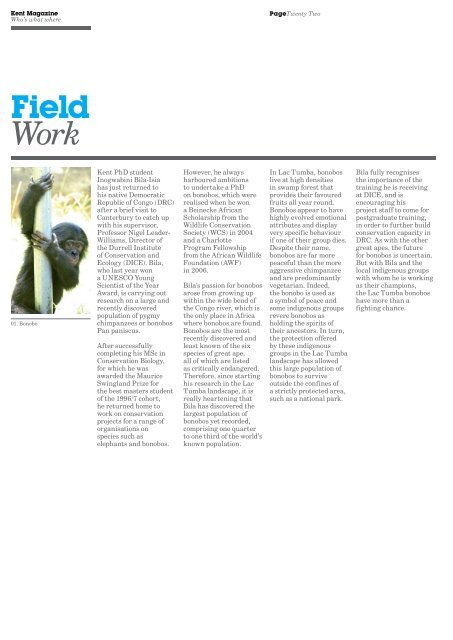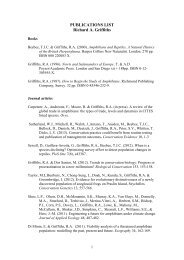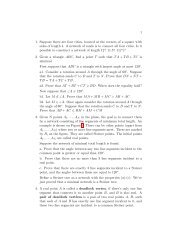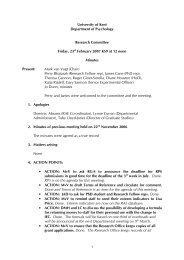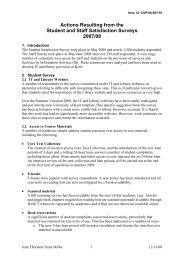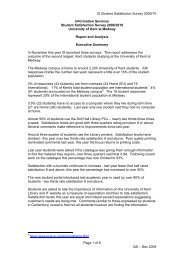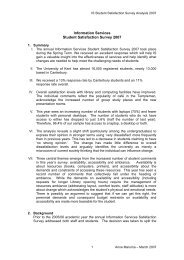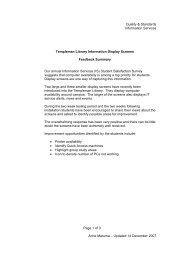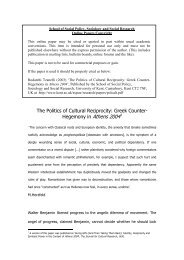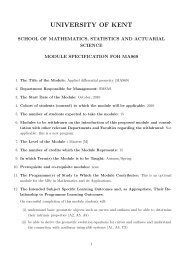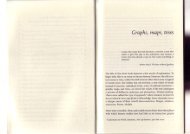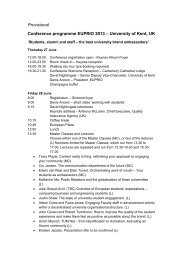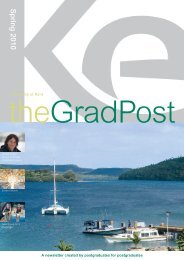The Magazine for the University of Kent
The Magazine for the University of Kent
The Magazine for the University of Kent
Create successful ePaper yourself
Turn your PDF publications into a flip-book with our unique Google optimized e-Paper software.
<strong>Kent</strong> <strong>Magazine</strong><br />
Who’s what where<br />
PageTwenty Two<br />
<strong>Kent</strong> <strong>Magazine</strong><br />
Who’s what where<br />
PageTwenty Three<br />
Field<br />
Work<br />
<strong>The</strong> End<br />
<strong>of</strong> Mr.Y<br />
Michael Leahy<br />
1934–2007<br />
01. Bonobo<br />
<strong>Kent</strong> PhD student<br />
Inogwabini Bila-Isia<br />
has just returned to<br />
his native Democratic<br />
Republic <strong>of</strong> Congo (DRC)<br />
after a brief visit to<br />
Canterbury to catch up<br />
with his supervisor,<br />
Pr<strong>of</strong>essor Nigel Leader-<br />
Williams, Director <strong>of</strong><br />
<strong>the</strong> Durrell Institute<br />
<strong>of</strong> Conservation and<br />
Ecology (DICE). Bila,<br />
who last year won<br />
a UNESCO Young<br />
Scientist <strong>of</strong> <strong>the</strong> Year<br />
Award, is carrying out<br />
research on a large and<br />
recently discovered<br />
population <strong>of</strong> pygmy<br />
chimpanzees or bonobos<br />
Pan paniscus.<br />
After successfully<br />
completing his MSc in<br />
Conservation Biology,<br />
<strong>for</strong> which he was<br />
awarded <strong>the</strong> Maurice<br />
Swingland Prize <strong>for</strong><br />
<strong>the</strong> best masters student<br />
<strong>of</strong> <strong>the</strong> 1996/7 cohort,<br />
he returned home to<br />
work on conservation<br />
projects <strong>for</strong> a range <strong>of</strong><br />
organisations on<br />
species such as<br />
elephants and bonobos.<br />
However, he always<br />
harboured ambitions<br />
to undertake a PhD<br />
on bonobos, which were<br />
realised when he won<br />
a Beinecke African<br />
Scholarship from <strong>the</strong><br />
Wildlife Conservation<br />
Society (WCS) in 2004<br />
and a Charlotte<br />
Program Fellowship<br />
from <strong>the</strong> African Wildlife<br />
Foundation (AWF)<br />
in 2006.<br />
Bila’s passion <strong>for</strong> bonobos<br />
arose from growing up<br />
within <strong>the</strong> wide bend <strong>of</strong><br />
<strong>the</strong> Congo river, which is<br />
<strong>the</strong> only place in Africa<br />
where bonobos are found.<br />
Bonobos are <strong>the</strong> most<br />
recently discovered and<br />
least known <strong>of</strong> <strong>the</strong> six<br />
species <strong>of</strong> great ape,<br />
all <strong>of</strong> which are listed<br />
as critically endangered.<br />
<strong>The</strong>re<strong>for</strong>e, since starting<br />
his research in <strong>the</strong> Lac<br />
Tumba landscape, it is<br />
really heartening that<br />
Bila has discovered <strong>the</strong><br />
largest population <strong>of</strong><br />
bonobos yet recorded,<br />
comprising one quarter<br />
to one third <strong>of</strong> <strong>the</strong> world’s<br />
known population.<br />
In Lac Tumba, bonobos<br />
live at high densities<br />
in swamp <strong>for</strong>est that<br />
provides <strong>the</strong>ir favoured<br />
fruits all year round.<br />
Bonobos appear to have<br />
highly evolved emotional<br />
attributes and display<br />
very specific behaviour<br />
if one <strong>of</strong> <strong>the</strong>ir group dies.<br />
Despite <strong>the</strong>ir name,<br />
bonobos are far more<br />
peaceful than <strong>the</strong> more<br />
aggressive chimpanzee<br />
and are predominantly<br />
vegetarian. Indeed,<br />
<strong>the</strong> bonobo is used as<br />
a symbol <strong>of</strong> peace and<br />
some indigenous groups<br />
revere bonobos as<br />
holding <strong>the</strong> spirits <strong>of</strong><br />
<strong>the</strong>ir ancestors. In turn,<br />
<strong>the</strong> protection <strong>of</strong>fered<br />
by <strong>the</strong>se indigenous<br />
groups in <strong>the</strong> Lac Tumba<br />
landscape has allowed<br />
this large population <strong>of</strong><br />
bonobos to survive<br />
outside <strong>the</strong> confines <strong>of</strong><br />
a strictly protected area,<br />
such as a national park.<br />
Bila fully recognises<br />
<strong>the</strong> importance <strong>of</strong> <strong>the</strong><br />
training he is receiving<br />
at DICE, and is<br />
encouraging his<br />
project staff to come <strong>for</strong><br />
postgraduate training,<br />
in order to fur<strong>the</strong>r build<br />
conservation capacity in<br />
DRC. As with <strong>the</strong> o<strong>the</strong>r<br />
great apes, <strong>the</strong> future<br />
<strong>for</strong> bonobos is uncertain.<br />
But with Bila and <strong>the</strong><br />
local indigenous groups<br />
with whom he is working<br />
as <strong>the</strong>ir champions,<br />
<strong>the</strong> Lac Tumba bonobos<br />
have more than a<br />
fighting chance.<br />
Described as ‘a Foucault’s<br />
Pendulum <strong>for</strong> <strong>the</strong> ipod<br />
generation’ (Philadelphia<br />
Enquirer), <strong>The</strong> End <strong>of</strong><br />
Mr. Y is <strong>the</strong> latest novel<br />
by Scarlett Thomas, a<br />
lecturer in <strong>the</strong> School<br />
<strong>of</strong> English. <strong>The</strong> novel<br />
features heroine Ariel<br />
Manto, a lonely PhD<br />
student who stumbles<br />
across a rare novel in<br />
a second-hand bookshop<br />
and takes <strong>the</strong> reader<br />
on a journey which<br />
begins in <strong>Kent</strong> and<br />
ends at <strong>the</strong> perimeter<br />
<strong>of</strong> thought itself.<br />
Scarlett describes her<br />
novel as ‘a thought<br />
experiment wrapped<br />
in a contemporary<br />
adventure novel that<br />
asks questions about<br />
thought, language,<br />
destiny and <strong>the</strong> very<br />
limits <strong>of</strong> being and time’.<br />
<strong>The</strong> novel brings toge<strong>the</strong>r<br />
such diverse <strong>the</strong>mes<br />
as quantum physics,<br />
post-structuralism,<br />
homoeopathy,<br />
evolutionary <strong>the</strong>ory,<br />
<strong>the</strong>ology and <strong>the</strong> origins<br />
<strong>of</strong> consciousness and<br />
moves at such a pace it<br />
is impossible to put down.<br />
<strong>Kent</strong> alumni will<br />
also notice distinct<br />
similarities between<br />
<strong>the</strong> university <strong>of</strong> <strong>The</strong><br />
End <strong>of</strong> Mr. Y and a<br />
certain o<strong>the</strong>r campus<br />
on a hill!<br />
<strong>The</strong> End <strong>of</strong> Mr.Y is<br />
published by Canongate<br />
(UK) and Harcourt (US).<br />
More in<strong>for</strong>mation about<br />
Scarlett Thomas is<br />
available on <strong>the</strong> School<br />
<strong>of</strong> English website at:<br />
www.kent.ac.uk/english/<br />
02. <strong>The</strong> End <strong>of</strong> Mr.Y<br />
Dr Michael Leahy was<br />
appointed Lecturer in<br />
Philosophy at <strong>Kent</strong> in<br />
1967, he was promoted<br />
to Senior Lecturer in<br />
1976 and was Faculty<br />
Admissions Officer<br />
from 1981 to 1985.<br />
He took early retirement<br />
in 1996 but returned to<br />
<strong>the</strong> <strong>University</strong> on a<br />
part-time basis as an<br />
Administrator in <strong>the</strong><br />
International Office until<br />
October 1999. Below we<br />
print an appreciation <strong>of</strong><br />
Mike’s life from Robert<br />
Cannon R66, a friend and<br />
<strong>for</strong>mer student.<br />
On Monday 21 May<br />
2007 Michael Leahy<br />
was buried in Chilham<br />
churchyard. For at least<br />
seven years Mike had<br />
had a <strong>for</strong>m <strong>of</strong> dementia<br />
that saw his fine mind<br />
and active, fit body slowly<br />
close in on itself. It was<br />
a terrible end <strong>for</strong><br />
someone who had been so<br />
mentally and physically<br />
alert. Mike was unusual<br />
in his combination <strong>of</strong><br />
intellectual and sporting<br />
excellence.<br />
<strong>The</strong> latter was dominated<br />
by cricket, which he<br />
played <strong>for</strong> many years as<br />
part <strong>of</strong> both <strong>University</strong><br />
and village teams.<br />
In o<strong>the</strong>r areas too he was<br />
full <strong>of</strong> life. His love and<br />
understanding <strong>of</strong> music<br />
was considerable, he<br />
had a pr<strong>of</strong>ound and<br />
discerning taste that<br />
ranged from Gregorian<br />
chant to <strong>the</strong> avant<br />
garde and included jazz<br />
which he had learnt to<br />
appreciate during his<br />
lectureship in America.<br />
No memory <strong>of</strong> him can<br />
fail to recall his refined<br />
and enthusiastic interest<br />
in wine. To dine with<br />
him and his wife Rosie<br />
was always both a<br />
gastronomic and bibulous<br />
treat. His cellar was large<br />
and wide in its scope and,<br />
in <strong>the</strong> early days, he<br />
made an important<br />
contribution to <strong>the</strong><br />
<strong>University</strong> cellars.<br />
But it is as a philosopher<br />
– both teacher and<br />
thinker – that he will<br />
be most remembered<br />
and sorely missed.<br />
Like his music, wine and<br />
sport, his interest was<br />
wide ranging – ra<strong>the</strong>r<br />
than merely eclectic.<br />
His passion <strong>for</strong> <strong>the</strong><br />
pre-Socratics – above<br />
all Parmenides – and<br />
at <strong>the</strong> o<strong>the</strong>r end <strong>of</strong> <strong>the</strong><br />
chronological and<br />
methodological scale,<br />
Wittgenstein, was<br />
perhaps most notable.<br />
As a teacher he taught<br />
not so much <strong>the</strong> facts <strong>of</strong><br />
<strong>the</strong> matter, although he<br />
was an excellent guide,<br />
but ra<strong>the</strong>r why <strong>the</strong>se<br />
writings and ideas were<br />
so important. Above all<br />
he showed his students<br />
how to make use <strong>of</strong><br />
philosophy: how to look<br />
past appearance and<br />
probe <strong>the</strong> cogency and<br />
validity <strong>of</strong> what one saw,<br />
heard or was taught.<br />
He was an inspiration;<br />
in particular because<br />
this serious concern was<br />
so naturally accompanied<br />
by humour, wit and a<br />
wonderful sense <strong>of</strong> fun.<br />
<strong>The</strong> life that he taught<br />
one to illuminate with<br />
philosophic application<br />
was a life that was truly<br />
worth <strong>the</strong> ef<strong>for</strong>t – full<br />
<strong>of</strong> pleasure and humour,<br />
<strong>the</strong> richness <strong>of</strong> <strong>the</strong> arts,<br />
physical activity, <strong>the</strong><br />
joys <strong>of</strong> good food and<br />
wine. Like Socrates’s<br />
companions at <strong>the</strong> end<br />
<strong>of</strong> <strong>the</strong> Phaedo, it is our<br />
loss that we mourn on<br />
his untimely death –<br />
and our lives that will<br />
remain enriched by <strong>the</strong><br />
memory <strong>of</strong> everything<br />
witty, entertaining,<br />
thoughtful and<br />
instructive that he did.<br />
03. Michael Leahy


